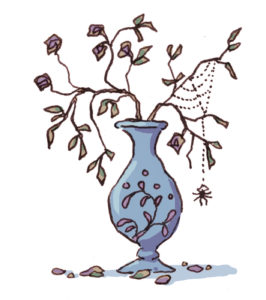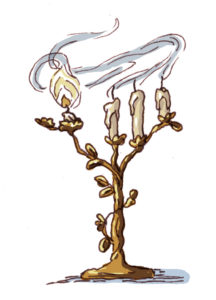
Art by Kathleen Jennings as always
So I was supposed to be answering interview questions, but for some reason I wrote this. Everyone’s experience and advice will be different, but this is mine.[1].
- A writer writes (Thanks, Throw Momma from the Train and Sean Williams)
You write.
You apply the bum glue and you write.
You write no matter how attractive cleaning the toilet suddenly becomes, or how urgent clearing out the vegetable crisper seems or doing your tax or cutting your own hair (to note: that last one is an especially bad idea – why yes, I have done these stupid things so you don’t have to).[2]
You write even though you are certain this is the worst thing you – or indeed anyone else on this planet or any other – have ever written.
You write.
Sure, writers have demons and inner critics that whisper horrible, discouraging things to us. But some of us give them undignified pet names and enrol them in short courses to get them off our hands … send them off to playgroups where they make children cry or rob banks.
The important thing is that you don’t listen to them, or not everything at least. Listen to the reasonable stuff (“Perhaps you should check your spelling or find a good and faithful beta-reader”) but not the unreasonable ass-crazy stuff (“If you write that no one will ever love you again, you will be pilloried, PILLORIED I say! Also, your dog will crap in your best shoes, even if you don’t own a dog. So it has been written and so it has been foretold!”)
There are ways to get through the writer’s block (which is just fear spelled differently and with extra letters), there are ways to finish stuff. The first step is telling the inner critic to shut the hell up when you’re writing a first draft. A first draft doesn’t need to be perfect, it just needs to be. A first draft is BrainVomit™ (thank you again, Sean Williams). So just write. Write garbage. All the spelling mistakes, all the grammatical errors (but take them out in future drafts – very important next yet-oft-forgot step).
Just breathe deeply and just write.
- Be grateful
If someone has helped you along the way, be grateful. Acknowledge them publicly. You are no less a writer or creator of a story if you had help along the way.
We all like to think this is an entirely solitary profession (and to some extent, sure, it is and it has to be because being surrounded by other people, especially ones you like, can be very distracting unless you’re extremely disciplined). Part of the job is entirely solitary, but you don’t create in a vacuum. You will help others and others will help you.
If you get to the point where you can do this as your full-time job, then be really grateful and never lose the memory of the times when you struggled. Don’t go to festivals or book clubs and tell everyone how easy it was, that you encountered no obstacles, that no one helped you, don’t tell everyone how fabulous and deserving of all this you are. There are plenty of really good writers out there who don’t get breaks or the chances, who don’t get discovered. So, be humble, not an asshat.
Also be very aware that it might all change tomorrow. This is a snakes and ladders game; you might find yourself wishing you’d been more grateful to people who helped you early on when you were climbing the ladder now that you’re on the snaky slippery-dip. There are more slowly starving mid-listers (although speeds may vary) than there are JK Rowlings with Scottish castles.
- Networking is not a dirty word

White fox by Kathleen Jennings (not a puppy)
Networking doesn’t mean comparing business card sizes in a private club.
Join a writers’ group. Find a mentor. Have beta-readers. Hold a weekly Write Club: Peter M. Ball and I have been doing this for about ten years now (which he talks about in detail here). Once a week we meet on a Wednesday, spend the first 30-45 minutes venting, exchanging market opportunities, offering support/sympathy, and advice on new projects and stalled ones. We also drink coffee. Then we start writing: two hours straight, then we have lunch and recalibrate, then two more hours of writing. It’s not a social chat thing, it’s a professional gathering with a friend. The work is primary.
Networking is about building mutually beneficial relationships, not about getting as much out of other people as possible, or about you being the one doing ALL the favours. It’s about building a community for yourself and others. I’ve said a lot of other stuff about networking for writers over here, so get yourself a cuppa and a biscuit (okay, two biscuits) and have a read.
- Ditch your sense of entitlement
We write because if we don’t, we explode. Our dreams turn sour (thanks, Meg Vann for that one). No one asked you to do this career job.
You’re not entitled to a publishing contract or an award or even a viable career. This is not a job where you have staged promotions or pay increases. You don’t have performance appraisals where someone in power pats you on the shoulder and says “Well done.” So, the sooner you let that expectation go, the happier you’ll be.
Awards are a crap shoot: you have no guarantee of winning any during your career (or even being nominated for one), and they are basically nice statuettes and something a marketing department can put on your next book. If you’re really lucky, some have giant cheques attached (most don’t). I’ve won awards and I’ve lost awards, and neither of those things have made me a better or worse writer.
Try to ‘future proof’ your brain, by which I mean prepare for failure (don’t expect it but do have a back-up plan just in case). There will be years, even for established writers, when you don’t have good sales; when you write stories that no one but you loves. You might not have a novel coming out because of the vagaries of the industry: you will hear the phrase “disappointing sales figures” from publishers who could not be fucked to do any marketing and promotion for your last book because they spent their entire budget on bus adverts for authors who can sell out with a single tweet. You will contemplate going back to a job in an office as a lampshade, or as a skunk wrangler.
But you will keep writing because a writer writes, and just because it feels like it’s over, it’s not over until the horizontally over-burdened lady sings. You keep writing because the next book will find someone who loves it. You will keep writing because you must have faith in yourself and what you do. You will keep writing because if you don’t your head and heart will burst.
You will keep writing because the person you write for first and foremost is yourself, and you write because you cannot do anything else.

- Practice makes almost-perfect
Nothing’s ever perfect, not really to the writer’s mind, no matter how much readers love it.
We will always pick at what we’ve done (the nose isn’t quite right, the left forearm is bigger than the right, there’s a little bit of adjectival overload that I would totally not do now and OMG can I please re-edit that book from five years ago?). We’ll never be entirely happy. Accept it.
For your own sanity there’s a point where you must learn to let something go. I don’t know what that point will be for you – Fahrenheit 451? – because every writer is different.
But if you are one day brooding darkly about how you’re an unrecognised genius and no one’s accepting your work for publication, then maybe check that you’ve actually sent some stuff out?
Rejection stings, but it should not destroy you or your joy in writing: just remember that not everyone is going to love everything you write. Either because it’s not to their taste, or it’s Tuesday, or their budgie died, or they’re just being mean, or maybe there is a valid reason why your story is deeply inimical to their beliefs and is therefore not for them. You cannot follow all your readers home and explain everything to them (I think that’s Le Guin paraphrased by Miéville): that’s called stalking and it is (quite rightly) frowned upon.
You must learn to let go. Whoosh.
- Be supportive
Just keep your pompoms at the ready and if someone has good news, then give them a big old “Yay, you!” Don’t leave comments on their Facebook posts along the lines of “Congrats. Wish that had happened to me.” That’s just, no. Don’t. Don’t hijack someone’s joy. Just don’t.
Another person’s success takes nothing away from you (unless they published a book they stole from you, obviously, but that’s outside the ambit of this post).
Be collegial: share open submissions posts (always with the caveat that individuals MUST do their own due diligence checks). Don’t hoard opportunities, you’re neither a miser nor a dragon (or you shouldn’t be). If you’ve got nothing for an anthology but know someone who might be a good fit, then suggest them to the editor.
Beta-read for others (but don’t always be the beta-reader – this needs to be an equal exchange of work). Two-way street, baby.
Don’t have rivals. I run my own race, other people run theirs. I love their work and I’m happy to say so. Why wouldn’t I be? More good writing out in the world? Thumbs up!
- Be professional

Be organised and informed as a writer. Know the difference between sim-subs and multiple subs (equally as important in publishing as in BDSM circles). Read submission guidelines. Be aware of what rights you’re selling or licensing.
Just because you’ve written “The End” doesn’t mean your job is done. You’ve finished a first draft (Yay, you!), but now you need to let it lie fallow in the bottom drawer for two weeks (yes, a randomly chosen number) coz that gives you time to forget it. It gives you time to forget how brilliant and flawless you think it is. Put a bring-up date in your diary. Don’t look at the story until then, although by all means write yourself post-it notes if you get ideas in the shower, etc. (I do not recommend post-its in the shower, but I do suggest you keep some of those kids’ crayons that write on tiles there). When your diary says “Hey, it’s time”, then get that story out and read it with fresh eyes. Cry. Regroup. Make the beverage of your choice. Begin the editing process. Don’t use a red pen because then it looks like a nasty teacher has failed your assignment. Use blue or green. Unless of course you really love red pen, in which case, use the red pen.
This one is my bugbear and certain to send me into a rage: don’t send a Like My Page request/demand after you’ve just sent someone a friend request on the Face of Book. And you know what? Think about it for a few months. See if you actually interact with that person, see if you like them, they like you. Have you read their books? Even then don’t expect someone to come to the party.
Have you liked their page? Probably not. Yes, writers are also readers but they are probably not your primary target market – not least of all because we’re all bloody impoverished and trying to sell our own books! My advice on building an online presence can be found here at The Writing Platform.
And seriously do not call someone out for not liking your page. This is the behaviour of a nutbar. Just don’t do it. Remain polite at all times no matter how hard that might be. If in doubt, withdraw. There’s an unfriend function for a reason.
- Don’t answer reviews
Even if you think the reviewer is entirely wrong-headed, wrong, unpleasant, drunk, stoned, vicious and vituperative, don’t answer the reviewer.
Again, there is also the horrible chance that they might be right …
If in doubt, take advice from Neil Gaiman (always a source of wisdom as well as excellent books) who says: “When you publish a book – when you make art – people are free to say what they want about it. You can’t tell people they liked a book they didn’t like, and there is, in the end, no arguing with personal taste. Different people like different things. Best to move on and make good art as best you can, instead of arguing.” There’s an even better one about just writing a new book that’s so brilliant that critics and other writers will eviscerate themselves in despair but I couldn’t find that one (so you get my crappy paraphrasing).
By all means, say whatever you want to your nearest and dearest. Rage, chew shoes, knock over rubbish bins and destroy newspapers. But do not go public. The internet never forgets. If you feel you must get it out of your system, then write it down on a piece of paper. Put it in a bottom drawer overnight or stick it to the fridge, as is your preference. The next day, burn it. Have a cuppa and a biscuit, then go forth and write again.

- Try not to burn bridges, especially while you’re standing on them
Pretty self-explanatory.
If you’re having a bad experience with a publisher or another writer or bookseller, etc, unless it’s utterly necessary to do otherwise, keep it private. We lose sight of this a lot in world where we cannot digest unless we Instagram our food (I’m very guilty of this food-related quirk, but hey, the food is so pretty and I never have a fight with the food).
Also, be sure of your facts before you open fire on social media. Every situation is going to be different, sure, and I don’t have the bandwidth to cover all the possibilities. But before you light up the flamethrower, take a deep breath. Do your research. Know what you’re talking about, have all your facts at your fingertips – don’t charge into an argument with emotional shouting when you cannot back up your claims with timelines, evidence, etc.
If a situation is doing your head in: step away. Do not engage. Don’t feed the trolls remains a very wise piece of advice. Extract yourself from the situation as best you can; you might have to cut your losses, but it will be worth it in the end for your peace of mind. And then, if somewhere down the track someone comes to ask why you cut ties with a particular publisher/writer/agent, etc, feel free to give an explanation or a warning. But be wary of being vindictive (or defamatory) – ultimately that will only damage you if you’re spending your time fuming after the event.
And be particularly wary of complaining that no one supported your kickstarter/course/charity anthology/trip that you want to take your chihuahua, Esmerelda, on to the Bahamas. That might well be a cause dear to your heart, it might well be worthy AF but no one is obliged to pledge funds or write for free or keep Esmeralda in little tiny dog bikinis; it’s your passion, not theirs.
And frankly, if you’re dressing your chihuahua in bikinis, you might have more problems than I can offer advice on. Just saying.
- Not everyone who writes will get published and that is okay
Not everyone writes to be published. Not everyone wants to be published. Some write for therapy. Some write for amusement. Some write for the sheer joy of a creative personal pursuit. Some write to save themselves and that’s nothing to do with anyone else.
If your writing is a hobby, then good on you! If you don’t want to publish, then huzzah! You’re doing it because you love it.
It is HARD getting published. It is HARD making a living as a full-time writer. It is HARD to keep going, and there is definitely a weird setting on those of us who do so. We really, really are weird.
- Random tip for free (hey, this is all free): not all of this advice will work for all writers

I’m not suggesting it will. These techniques have just worked for me at various times and to varying degrees. Every writer is different.
Try a new technique by all means, but if it doesn’t work for you (randomly chosen test period: two weeks) then give it up as it is probably becoming a waste of time, an obstruction to your process, and something that will make you feel (even infinitesimally) like a failure. Experiment but do not become a slave to new techniques – a new technique junkie is just a professional procrastinator by another name. But please note: being a decent human being and a good networker and a helpful builder of community? Not negotiable. They aren’t techniques or tactics to be shrugged off coz they’re too hard. I’m talking about things like rising early to get in 500 words before breakfast, or writing on your morning commute. You know, stuff that affects no one but you.
So: write.
Keep writing.
We are frail, we are fragile, we are insecure, but we have a core of steel (that’s how we survive) so we write and we keep writing. Through everything.
[1] Major thanks to Dennan Chew and Kylie Thompson for their feedback.
[2] Someone (ahem, Kylie) asked “Yeah, but how do you actually write through when everything is turning to shit?” And that is a fair question, one that deserves its own post on getting through The Block. And I shall write it one day.


One Response to How To Be A Writer